
From my perspective, Snyder's
Watchmen achieves two goals. It delivers a visually stimulating companion piece for dedicated fans. And it provides a portal for newcomers taking their first tour through Moore and Gibbons' thought-provoking but pessimistic universe. Their next step should be toward the bookstore, where the definitive version of Watchmen still waits.
It's somewhat appropriate for director
Zack Snyder to accept the challenge of translating Watchmen to film. Like the proud but overmatched Spartans in Snyder's breakthrough smash, 300, he's waging a battle that can't be won. Whatever version he delivers, it will be compared to Moore's vision — which means it's likely to disappoint the graphic novel's uncompromising fan base. Even Moore refuses to endorse any cinematic renditions of his work, believing film, as a medium, can't do his comic-book story justice…[
WorstPreviews]
If you've never read WATCHMEN, I'm recommending you wait until after you've seen the film. Everyone I've spoken to who saw the film as WATCHMEN virgins loved it. And believe me, that was not at all what I was expecting to hear. For all of you first timers, here is a synopsis. Don't read the spoilers below. WATCHMEN is set in an alternate 1980's America. Remember the 80's? Big hair, bad music (no one send me hate mail for that please) and constant fear of nuclear war with the Soviet Union. Well, in the version of the hairspray decade, the tension is still there. But we have a special weapon. Dr. Manhattan (Billy Crudup). In 1959, scientist Jon Osterman accidentally enters an “Intrinsic Field Subtractor” that disintegrates his body. He is able to rebuild himself with his mind, one cell at a time, as a giant blue (and often naked and well-hung) superman who has incredible abilities and keeps the Soviets at bay. But he's becoming more and more alien. Nixon is running for a third term and tensions are growing despite Mr. Blue. The streets are getting violent as people wait for the end. The symbolic Doomsday Clock inches closer to midnight and things start to fall apart. But what about our superheroes?… [
JOBLO]
No comic book has been the subject of more essays and serious literary discussion than Alan Moore and Dave Gibbons'
Watchmen. It has been named one of the 100 greatest novels of the past century by Time Magazine. Released 20 years ago, the 12-issue maxi-series was a groundbreaking achievement for comics. Written “for adults,”
Watchmen opened the doors for thought-provoking and intelligent comics in the mainstream. Two decades after its arrival, there is still no greater comic book.
In honor of the 20-year anniversary, DC Comics released a $75 oversized hardcover,
Absolute Watchmen. For the first time, the series can be enjoyed at a considerably larger size and with completely re-mastered color. Few would argue the brilliance of Moore's book, but get this — the
Absolute Edition makes this epic tale even better. That's right, the story lauded by critics and loved by fans is now more powerful than any version you have previously read…[
IGN]
It becomes clear that a plan exists, though it's unclear who is orchestrating it, to destroy the planet. Part of the plan involves getting rid of the Watchmen: Rorschach is slung in jail for a crime he didn't commit; Dr Manhattan is plunged into such emotional despair that he exiles himself on Mars. The screenplay, by
David Hayter and Alex Tse, does a good job at retaining the teeming, interlinked, hyper-allusive strands of the original comic book without losing complete track of structure and coherence. It portrays, with convincing apocalyptic dread, mid-Eighties New York both in generic terms (the engloomed, rain-lashed city so darkly beloved of pulp novelists) and with a sociological edge (in economic freefall, its streets full of knife-wielding criminals)…[
Telegraph.co.uk]
Snyder added a few light / grisly / explicit touches of his own: a pool of blood that forms a smiley face; the bloody, pulpy aftermath of a superhero “rescue,” a street prostitute exposing her breasts, and so forth. One character gets his hands cut off instead of having his throat sliced. The ending … well, I'll avoid spoilers and come back to its muted effectiveness at another time.
What frustrates me as much as anything is that one transcendent sequence, which is a brilliant distillation of an entire issue (or a chapter in the collected graphic novel edition). It's so good that it made me wish for the rest of the movie to rise to that level. But things come crashing down to earth in the next scene with a shot of President Nixon's wacky long nose. It gets a laugh, yes, but it also breaks the spell that was the best thing in the movie up to that point. From that point forward, the action scoots along. Other sequences are memorable — Rorschach in prison, Archie returning to flight — but nothing quite lives up to that flashback segment…[
Cimenatical]
Snyder and writers David Hayter and Alex Tse never find a reason for those unfamiliar with the graphic novel to care about any of this nonsense. And it is nonsense. When one superhero has to take a Zen break, he does so on Mars. Of course he does.
The film opens with a brutal killing, then moves on to a credit-roll newsreel of sorts that takes us though the Cold War years, landing us in 1985 when Nixon is in his third term, tipping us that we're in an alternate 1985 America, where our superheroes have taken care of Woodward and Bernstein and other forces have evidently taken care of the U.S. Constitution.[THR]
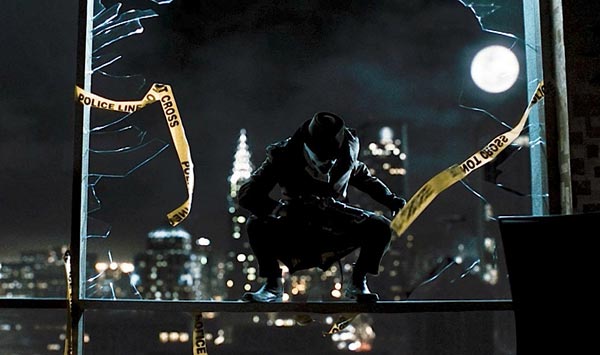
In many ways Watchmen reminds me of Francis Ford Coppola's The Godfather. This, I know, is a big statement to make, and it's not a statement based on simple equivalency of quality (I don't want to make grandiose claims about the quality of Watchmen at this point. I want to see it again. And maybe again. But it's a goddamned good movie, and I suspect an even better one in Director's Cut form), but on theme and storytelling and audacity. Like The Godfather, Watchmen is a story about power in post-WWII 20th century America, except that the Corleone saga is about acquiring power while Watchmen is about using it. Both films are generational epics that subvert expectations about genre pictures; The Godfather approaches mob movies from a completely new point of view while Watchmen turns all of your preconceptions about superheroes back on you… [
CHUD]
Watchmen was a story of its time, and it still works as an individual character study. But its themes and ideas are no longer ground breaking, and they may not be relevant anymore. Our current fears reside not in instant nuclear annihilation by a state power, but in slow death by environmental and economic collapse. Without going into details, the slightly altered ending makes the villain's ideology even less plausible, considering how we now know how mass populations react to um… certain events.
In the end, Zack Snyder does deserve credit for not making the material more cinematic than it naturally is. Yes, there is a little more violence, a touch more action, and plenty of stylized slow motion (too much, as the film feels like the 161 minutes that it is), but the story is still basically retired super heroes talking about their old days while trying to solve a solitary mystery. He is more or less faithful in incident, and completely faithful in tone and spirit (my fear that he would make the dour, depressing story more ‘cool' is unfounded)…[Scott Mendelson –
Huffingtonpost]
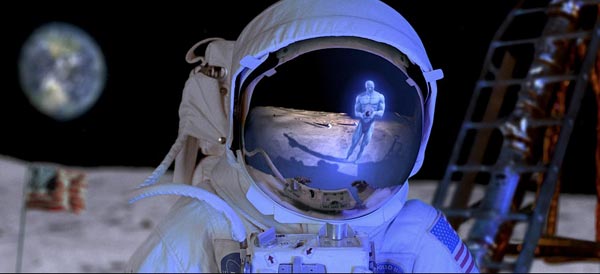
One more minor gripe – the choice to populate the soundtrack with highly recognizable rock songs is a very hit-and-miss endeavor. It's true that many of these songs are cited directly in he source material, but that still doesn't change the fact that when we hear the first strains of Simon & Garfunkel's “The Sound of Silence”, we immediately think of “The Graduate”, which is no ones intention. The same goes for otherwise worthwhile music by Leonard Cohen, Bob Dylan, and even Philip Glass. The use of “Ride of the Valkyries” during a Vietnam War sequence is particularly distracting. That music has been so many times to reference and spoof “Apocalypse Now” – I don't know what Snyder was hoping to achieve by featuring it in this context in this film. Especially when there are so many other pieces of music with considerably less baggage that readily evokes the Vietnam War. But I digress… [
Twitch]
Yet how to swallow the camp and patent silliness of a sex scene that goes well past the conceit that conventional intimacy is a failure for these folks while latex outfits, busting heads and naughty night-time sojourns on the Owl-bus as a definite turn on, or the cornball Egyptian super-palace in Antarctica or the overblown clock-palace on Mars? It probably works better on the printed page (your mileage may vary). When the film resorts to ‘comic book action' (perhaps a desire to appeal to the four quadrant movie-going audience) and Snyder's typical slow-mo and speed ramp photography (thankfully this is much less than 300) or takes somewhat overblown contemplative trips to Mars things are clumsy and awkward. And what's the deal here?… [
Row Three]
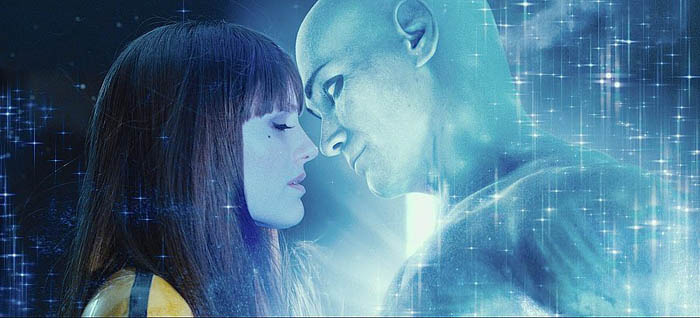
“Accuracy” remains the overriding principle of this project, and fans of the book will be awestruck at how much appears intact onscreen. Not just the dialogue (which is often word-for-word) or the characters (who retain the same rich fascination as they do on the page), but in the dense, indescribable details which crowd the frame for our attention. The blimps in the sky, the ads on the billboards, that strange-looking fellow in the background proclaiming that the end is nigh… all of them conjure a one-of-a-kind alternate history so elegantly and completely as to take the breath away… [
Mania]
A new book gives an amazing insight into the creative process behind Watchmen, the classic graphic novel by Alan Moore and Dave Gibbons. And the more you see the different sketches and ideas that Moore and Gibbons tossed around, the more you see just how radically they were helping to reinvent the superhero.
It's rare to get such a close look inside the creative process behind any work as Gibbons grants us here. And oftentimes, when you do get to see all the rough drafts, outtakes and stoned bull sessions, the work ends up cheapened a bit. You realize quite how much of it was luck, or good editing, or cherry-picking. (I'm looking at you, Complete Poems Of Sylvia Plath.) But the unused art in Watching The Watchmen, just out from Titan Books, is just as compelling as the stuff that made it in in the end… [
IO9 ]
The only casualty is classic structure. Watching this film is like trying to follow a conversation between two crackheads. The words and images are familiar, but they don't fit together in a way that constructs inherent meaning. Everything is just a really colourful, hypnotic blur.
The deeper meaning of the piece must be constructed in our own mind as we contemplate some pretty hefty ideas about the nature of personal responsibility, the presence or absence of God, and the function of human love.
Big ideas have a tendency to feel awkward and contrived on screen, but Snyder's film is big enough to accommodate these hulking dimensions, and thanks to a soundtrack that communicates a sense of time and place – in addition to a driving beat and some nostalgic flashbacks – Watchmen proves the impossible is little more than a state of mind… [
Dose.ca]
“Watchmen” is a good movie. It's not great, although it sure does try to be. You can tell after about an hour that it's striving to be a profound and meaningful story concerning the “true” nature of superheroes and humanity. It clearly doesn't want to be thought of as “just” some superhero movie. However, the movie contains a fatal flaw that prevents it from being that great movie it oh so wants to be. What is that fatal flaw?…[
411mania.com]
 In many ways Watchmen reminds me of Francis Ford Coppola's The Godfather. This, I know, is a big statement to make, and it's not a statement based on simple equivalency of quality (I don't want to make grandiose claims about the quality of Watchmen at this point. I want to see it again. And maybe again. But it's a goddamned good movie, and I suspect an even better one in Director's Cut form), but on theme and storytelling and audacity. Like The Godfather, Watchmen is a story about power in post-WWII 20th century America, except that the Corleone saga is about acquiring power while Watchmen is about using it. Both films are generational epics that subvert expectations about genre pictures; The Godfather approaches mob movies from a completely new point of view while Watchmen turns all of your preconceptions about superheroes back on you… [CHUD]
Watchmen was a story of its time, and it still works as an individual character study. But its themes and ideas are no longer ground breaking, and they may not be relevant anymore. Our current fears reside not in instant nuclear annihilation by a state power, but in slow death by environmental and economic collapse. Without going into details, the slightly altered ending makes the villain's ideology even less plausible, considering how we now know how mass populations react to um… certain events.
In the end, Zack Snyder does deserve credit for not making the material more cinematic than it naturally is. Yes, there is a little more violence, a touch more action, and plenty of stylized slow motion (too much, as the film feels like the 161 minutes that it is), but the story is still basically retired super heroes talking about their old days while trying to solve a solitary mystery. He is more or less faithful in incident, and completely faithful in tone and spirit (my fear that he would make the dour, depressing story more ‘cool' is unfounded)…[Scott Mendelson – Huffingtonpost]
In many ways Watchmen reminds me of Francis Ford Coppola's The Godfather. This, I know, is a big statement to make, and it's not a statement based on simple equivalency of quality (I don't want to make grandiose claims about the quality of Watchmen at this point. I want to see it again. And maybe again. But it's a goddamned good movie, and I suspect an even better one in Director's Cut form), but on theme and storytelling and audacity. Like The Godfather, Watchmen is a story about power in post-WWII 20th century America, except that the Corleone saga is about acquiring power while Watchmen is about using it. Both films are generational epics that subvert expectations about genre pictures; The Godfather approaches mob movies from a completely new point of view while Watchmen turns all of your preconceptions about superheroes back on you… [CHUD]
Watchmen was a story of its time, and it still works as an individual character study. But its themes and ideas are no longer ground breaking, and they may not be relevant anymore. Our current fears reside not in instant nuclear annihilation by a state power, but in slow death by environmental and economic collapse. Without going into details, the slightly altered ending makes the villain's ideology even less plausible, considering how we now know how mass populations react to um… certain events.
In the end, Zack Snyder does deserve credit for not making the material more cinematic than it naturally is. Yes, there is a little more violence, a touch more action, and plenty of stylized slow motion (too much, as the film feels like the 161 minutes that it is), but the story is still basically retired super heroes talking about their old days while trying to solve a solitary mystery. He is more or less faithful in incident, and completely faithful in tone and spirit (my fear that he would make the dour, depressing story more ‘cool' is unfounded)…[Scott Mendelson – Huffingtonpost]
 One more minor gripe – the choice to populate the soundtrack with highly recognizable rock songs is a very hit-and-miss endeavor. It's true that many of these songs are cited directly in he source material, but that still doesn't change the fact that when we hear the first strains of Simon & Garfunkel's “The Sound of Silence”, we immediately think of “The Graduate”, which is no ones intention. The same goes for otherwise worthwhile music by Leonard Cohen, Bob Dylan, and even Philip Glass. The use of “Ride of the Valkyries” during a Vietnam War sequence is particularly distracting. That music has been so many times to reference and spoof “Apocalypse Now” – I don't know what Snyder was hoping to achieve by featuring it in this context in this film. Especially when there are so many other pieces of music with considerably less baggage that readily evokes the Vietnam War. But I digress… [Twitch]
Yet how to swallow the camp and patent silliness of a sex scene that goes well past the conceit that conventional intimacy is a failure for these folks while latex outfits, busting heads and naughty night-time sojourns on the Owl-bus as a definite turn on, or the cornball Egyptian super-palace in Antarctica or the overblown clock-palace on Mars? It probably works better on the printed page (your mileage may vary). When the film resorts to ‘comic book action' (perhaps a desire to appeal to the four quadrant movie-going audience) and Snyder's typical slow-mo and speed ramp photography (thankfully this is much less than 300) or takes somewhat overblown contemplative trips to Mars things are clumsy and awkward. And what's the deal here?… [Row Three]
One more minor gripe – the choice to populate the soundtrack with highly recognizable rock songs is a very hit-and-miss endeavor. It's true that many of these songs are cited directly in he source material, but that still doesn't change the fact that when we hear the first strains of Simon & Garfunkel's “The Sound of Silence”, we immediately think of “The Graduate”, which is no ones intention. The same goes for otherwise worthwhile music by Leonard Cohen, Bob Dylan, and even Philip Glass. The use of “Ride of the Valkyries” during a Vietnam War sequence is particularly distracting. That music has been so many times to reference and spoof “Apocalypse Now” – I don't know what Snyder was hoping to achieve by featuring it in this context in this film. Especially when there are so many other pieces of music with considerably less baggage that readily evokes the Vietnam War. But I digress… [Twitch]
Yet how to swallow the camp and patent silliness of a sex scene that goes well past the conceit that conventional intimacy is a failure for these folks while latex outfits, busting heads and naughty night-time sojourns on the Owl-bus as a definite turn on, or the cornball Egyptian super-palace in Antarctica or the overblown clock-palace on Mars? It probably works better on the printed page (your mileage may vary). When the film resorts to ‘comic book action' (perhaps a desire to appeal to the four quadrant movie-going audience) and Snyder's typical slow-mo and speed ramp photography (thankfully this is much less than 300) or takes somewhat overblown contemplative trips to Mars things are clumsy and awkward. And what's the deal here?… [Row Three]
 “Accuracy” remains the overriding principle of this project, and fans of the book will be awestruck at how much appears intact onscreen. Not just the dialogue (which is often word-for-word) or the characters (who retain the same rich fascination as they do on the page), but in the dense, indescribable details which crowd the frame for our attention. The blimps in the sky, the ads on the billboards, that strange-looking fellow in the background proclaiming that the end is nigh… all of them conjure a one-of-a-kind alternate history so elegantly and completely as to take the breath away… [Mania]
A new book gives an amazing insight into the creative process behind Watchmen, the classic graphic novel by Alan Moore and Dave Gibbons. And the more you see the different sketches and ideas that Moore and Gibbons tossed around, the more you see just how radically they were helping to reinvent the superhero.
It's rare to get such a close look inside the creative process behind any work as Gibbons grants us here. And oftentimes, when you do get to see all the rough drafts, outtakes and stoned bull sessions, the work ends up cheapened a bit. You realize quite how much of it was luck, or good editing, or cherry-picking. (I'm looking at you, Complete Poems Of Sylvia Plath.) But the unused art in Watching The Watchmen, just out from Titan Books, is just as compelling as the stuff that made it in in the end… [IO9 ]
The only casualty is classic structure. Watching this film is like trying to follow a conversation between two crackheads. The words and images are familiar, but they don't fit together in a way that constructs inherent meaning. Everything is just a really colourful, hypnotic blur.
The deeper meaning of the piece must be constructed in our own mind as we contemplate some pretty hefty ideas about the nature of personal responsibility, the presence or absence of God, and the function of human love.
Big ideas have a tendency to feel awkward and contrived on screen, but Snyder's film is big enough to accommodate these hulking dimensions, and thanks to a soundtrack that communicates a sense of time and place – in addition to a driving beat and some nostalgic flashbacks – Watchmen proves the impossible is little more than a state of mind… [Dose.ca]
“Watchmen” is a good movie. It's not great, although it sure does try to be. You can tell after about an hour that it's striving to be a profound and meaningful story concerning the “true” nature of superheroes and humanity. It clearly doesn't want to be thought of as “just” some superhero movie. However, the movie contains a fatal flaw that prevents it from being that great movie it oh so wants to be. What is that fatal flaw?…[411mania.com]
“Accuracy” remains the overriding principle of this project, and fans of the book will be awestruck at how much appears intact onscreen. Not just the dialogue (which is often word-for-word) or the characters (who retain the same rich fascination as they do on the page), but in the dense, indescribable details which crowd the frame for our attention. The blimps in the sky, the ads on the billboards, that strange-looking fellow in the background proclaiming that the end is nigh… all of them conjure a one-of-a-kind alternate history so elegantly and completely as to take the breath away… [Mania]
A new book gives an amazing insight into the creative process behind Watchmen, the classic graphic novel by Alan Moore and Dave Gibbons. And the more you see the different sketches and ideas that Moore and Gibbons tossed around, the more you see just how radically they were helping to reinvent the superhero.
It's rare to get such a close look inside the creative process behind any work as Gibbons grants us here. And oftentimes, when you do get to see all the rough drafts, outtakes and stoned bull sessions, the work ends up cheapened a bit. You realize quite how much of it was luck, or good editing, or cherry-picking. (I'm looking at you, Complete Poems Of Sylvia Plath.) But the unused art in Watching The Watchmen, just out from Titan Books, is just as compelling as the stuff that made it in in the end… [IO9 ]
The only casualty is classic structure. Watching this film is like trying to follow a conversation between two crackheads. The words and images are familiar, but they don't fit together in a way that constructs inherent meaning. Everything is just a really colourful, hypnotic blur.
The deeper meaning of the piece must be constructed in our own mind as we contemplate some pretty hefty ideas about the nature of personal responsibility, the presence or absence of God, and the function of human love.
Big ideas have a tendency to feel awkward and contrived on screen, but Snyder's film is big enough to accommodate these hulking dimensions, and thanks to a soundtrack that communicates a sense of time and place – in addition to a driving beat and some nostalgic flashbacks – Watchmen proves the impossible is little more than a state of mind… [Dose.ca]
“Watchmen” is a good movie. It's not great, although it sure does try to be. You can tell after about an hour that it's striving to be a profound and meaningful story concerning the “true” nature of superheroes and humanity. It clearly doesn't want to be thought of as “just” some superhero movie. However, the movie contains a fatal flaw that prevents it from being that great movie it oh so wants to be. What is that fatal flaw?…[411mania.com]

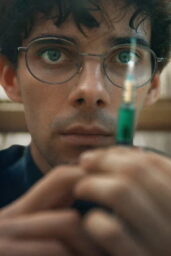
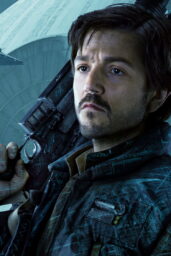



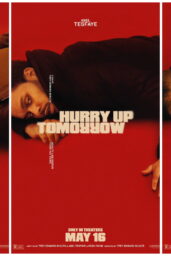


I kept thinking that the guy who played the Comedian was Javier Bardem (I found out later that it’s actually Jeffrey Dean Morgan), but the two actors definitely look alike